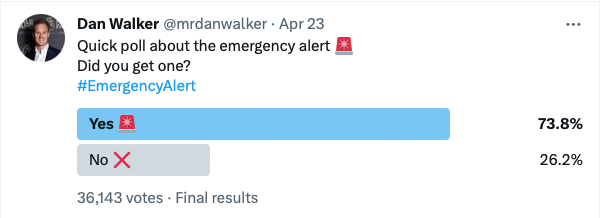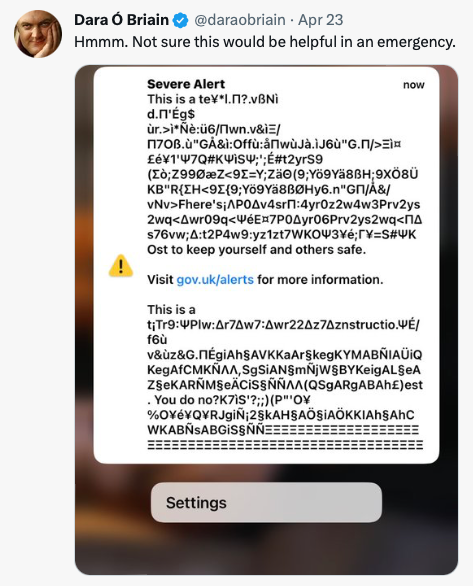Reviewing Sunday's emergency alert from a comms perspective
In the aftermath of the first test of a UK emergency alert system, there is clearly a lot of work that needs to be done…
Finding the problems is what is needed from any test, so it is interesting to see people’s views of what took place on Sunday 23 April at 3pm or in some cases what didn’t happen.
The challenge has been the communication around the action. It appeared to many that it come out of nowhere and the context was never really adequately explained.
I work in crisis and emergency communication so have read the National Preparedness report and other documents that talk about having this functionality. But many have not. It has helped to fuel a huge number of conspiracy theories that are being spread on social media.
It was never enough to assume that people would understand why this national alert system needed to be in place, or that they would just willingly submit to taking part. There has to be a conversation about personal preparedness and resilience that makes the creation of an alert system just part of the discussion. People have to recognise the risks that exist in the modern world and feel comfortable with what is being put in place to manage both today’s and tomorrow’s problems.
What we saw on Sunday was a huge expectation that this was a fully functional system and the public response was being tested. There was a lack of communication that this was a test of a system in development. A slight difference but it became central to the criticism that followed both from those who didn’t receive it, those who received it multiple times or those that received compromised messages.
Presenter Dan Walker did his own poll on Twitter to get an example of what percentage of people had received the alert.

While comedian Dara Ó Briain shared a message that had become scrambled.

The test was an opportunity to start the discussion about the developments that are being put in place and to involve the public as part of the solution rather than as a passive group. If people felt this was a test of the system not them, perhaps they would have been more willing participants and the problems would have been expected.
So what next? There is a chance to start to turn the tide in views about the alert that took place by sharing the information about what happened, and what is going to be done to improve the service. There will be many users of Three that may be concerned they are not made aware of the problem that is round the corner.
Communicating the outcome and the changes that are being made is essential to create trust and confidence in the system and how it will be used. And it is not just about the technical aspects, it is vital to get feedback from groups that were identified as potentially being adversely affected such as older people and those in abusive situations. How did it impact on them? What more can be done to use their feedback to improve the approach?
Having an emergency alert system that is ready and able to be used is an important part of national preparedness. But it will only be effective if people have confidence in it, how it works, and in those who will be operating it. We are at a starting point but there is a long way to go.
Amanda Coleman is a crisis communication expert and consultant, Founder of Amanda Coleman Communication and the author of Crisis Communication Strategies.
This post was originally published on her Amandacomms blog, titled Can You Hear Me? Read the original post.
.jpg&w=728&h=90&maxW=&maxH=&zc=1)
